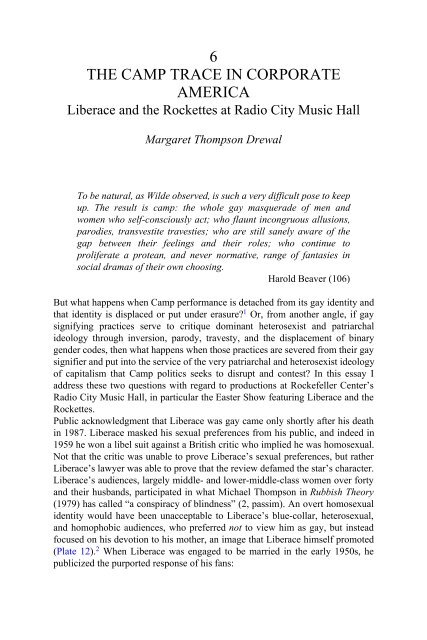Edited by Moe Meyer - Get a Free Blog
Edited by Moe Meyer - Get a Free Blog
Edited by Moe Meyer - Get a Free Blog
You also want an ePaper? Increase the reach of your titles
YUMPU automatically turns print PDFs into web optimized ePapers that Google loves.
6<br />
THE CAMP TRACE IN CORPORATE<br />
AMERICA<br />
Liberace and the Rockettes at Radio City Music Hall<br />
Margaret Thompson Drewal<br />
To be natural, as Wilde observed, is such a very difficult pose to keep<br />
up. The result is camp: the whole gay masquerade of men and<br />
women who self-consciously act; who flaunt incongruous allusions,<br />
parodies, transvestite travesties; who are still sanely aware of the<br />
gap between their feelings and their roles; who continue to<br />
proliferate a protean, and never normative, range of fantasies in<br />
social dramas of their own choosing.<br />
Harold Beaver (106)<br />
But what happens when Camp performance is detached from its gay identity and<br />
that identity is displaced or put under erasure? 1 Or, from another angle, if gay<br />
signifying practices serve to critique dominant heterosexist and patriarchal<br />
ideology through inversion, parody, travesty, and the displacement of binary<br />
gender codes, then what happens when those practices are severed from their gay<br />
signifier and put into the service of the very patriarchal and heterosexist ideology<br />
of capitalism that Camp politics seeks to disrupt and contest? In this essay I<br />
address these two questions with regard to productions at Rockefeller Center’s<br />
Radio City Music Hall, in particular the Easter Show featuring Liberace and the<br />
Rockettes.<br />
Public acknowledgment that Liberace was gay came only shortly after his death<br />
in 1987. Liberace masked his sexual preferences from his public, and indeed in<br />
1959 he won a libel suit against a British critic who implied he was homosexual.<br />
Not that the critic was unable to prove Liberace’s sexual preferences, but rather<br />
Liberace’s lawyer was able to prove that the review defamed the star’s character.<br />
Liberace’s audiences, largely middle- and lower-middle-class women over forty<br />
and their husbands, participated in what Michael Thompson in Rubbish Theory<br />
(1979) has called “a conspiracy of blindness” (2, passim). An overt homosexual<br />
identity would have been unacceptable to Liberace’s blue-collar, heterosexual,<br />
and homophobic audiences, who preferred not to view him as gay, but instead<br />
focused on his devotion to his mother, an image that Liberace himself promoted<br />
(Plate 12). 2 When Liberace was engaged to be married in the early 1950s, he<br />
publicized the purported response of his fans:


